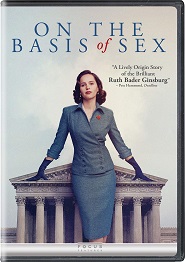
|
American Rhetoric: Movie Speech "On the Basis of Sex" (2018)
Radical. Social. Change. When I was in law school there was no women's bathroom. It's amazing to me now that we never complained -- not because we were timid; we were just astounded to be in law school at all. A hundred years ago Myra Bradwell wanted to be a lawyer. She had fulfilled the requirements for the Illinois bar, but she wasnít allowed to practice because she was a woman -- an injustice, she asked the Supreme Court to correct. Illinois was so confident of victory, they didnít even send a lawyer to argue their side. They were right. She lost. That was the first time someone went to court to challenge his or her prescribed gender role. A hundred years ago. Radical. Social. Change.
Sixty-five years ago, when women in Oregon wanted to work overtime, and
make more money, as men could, the Court looked to the precedent in
Bradwell -- and said no. So then there were two precedents. Then three.
Then four. And on. And on. And you can draw a direct line from Myra
Bradwell to
Gwendolyn Hoyt -- told ten years ago she was not entitled to a jury
of her peers. And a hundred years ago, I would not have the right to stand before you. There are a hundred and seventy-eight federal laws that differentiate on the basis of sex. Count them. The Government did the favor of compiling them for you. And while youíre at it, I urge you to read them. They're obstacles to our childrenís aspirations.
Judge Doyle: You're asking us to turn over nearly a century of precedent. Ruth Bader Ginsburg: Iím asking you to set a new precedent, as courts have done before when the law is outdated. Judge Doyle: But in those cases the courts had a clear constitutional handle. The word "woman" does not appear even once in the U.S. Constitution. Ruth Bader Ginsburg: Nor does the world "freedom," Your Honor. Second Judge: Go on, Professor Ginsburg.
Ruth Bader Ginsburg: The principle
purpose of
Section 214 is not to protect women nor to discriminate
against men. It is to provide caregivers the opportunity to work outside
the home. Therefore, as the Supreme Court did in
Levy v.
Louisiana, this court should fix the law [in the way] most in line
with the legislative intent. Extend the deduction to never-married men.
Help all caregivers equally. We're not asking you to change the country. That's already happened without any court's permission. We're asking you to protect the right of the country to change. Our sons and daughters are barred by law from opportunities based on assumptions about their abilities. How will they ever disprove these assumptions if laws like Section 214 are allowed to stand. We all must take these laws on, one by one for as long as it takes for their sakes. You have the power to set the precedent that will get us started. You can right this wrong. We rest our case on our briefs and argument, and ask that you reverse the Tax Courtís decision. |
|
© Copyright 2001-Present. |
